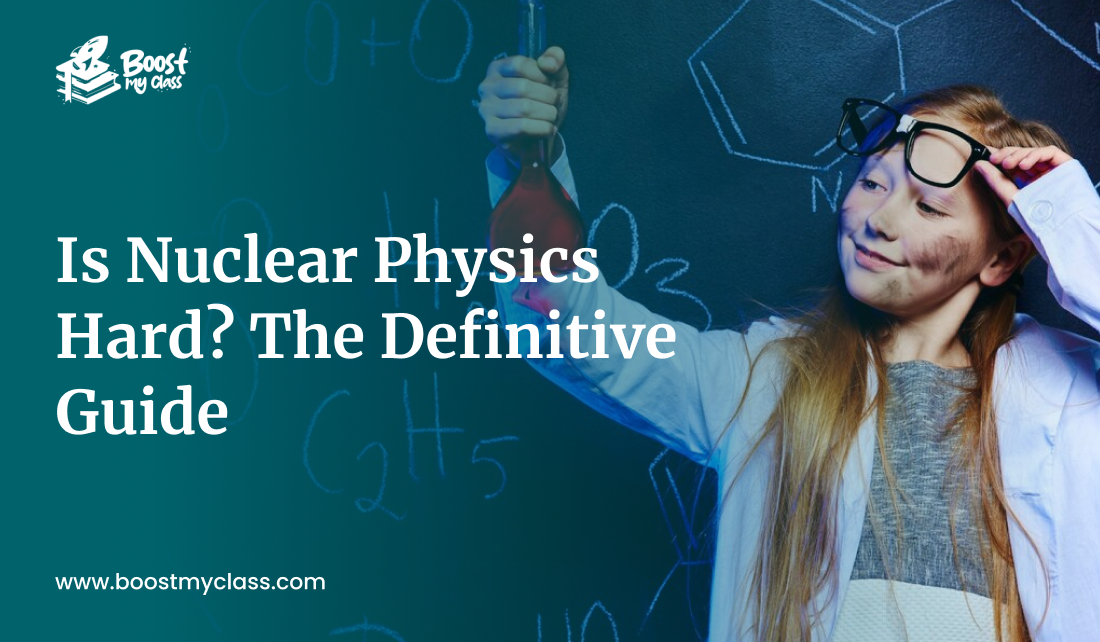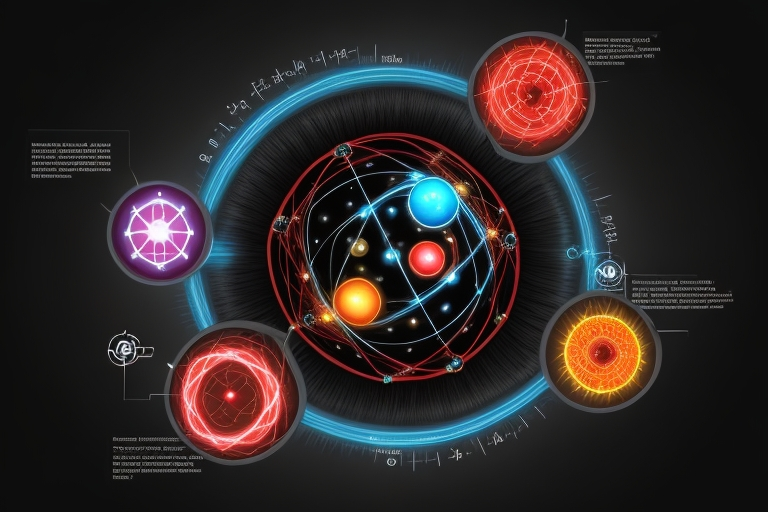Is Nuclear Physics Hard? The Definitive Guide

Is Nuclear Physics Hard? In this Guide, we’ll explore the Intricacies of Nuclear Physics.
- The Complex Topics Of Nuclear Physics.
- Career Opportunities In This Field.
- Majors In Nuclear Physics.
- Best Nuclear Physics Universities In The USA.
So,
Is Nuclear Physics an insurmountable Mountain to Climb, or can it be conquered? Join us as we unravel the Science behind the Atom’s core.
Key Takeaway
- Nuclear Physics examines Atomic Nuclei’s structure, behavior, and interactions and calls for a strong background in Mathematics and Physics.
- The field has Mathematical, experimental, and data analysis challenges. However, it has essential uses in Astrophysics, Medicine, and Nuclear Energy.
- Institutions like MIT, Michigan State University, and Stony Brook University excel in Nuclear Physics education and research, offering forefront facilities and renowned faculty.
- Researchers in Nuclear Physics can work in Academia, Government Labs, or the Private Sector.
Table of Contents
What Is Nuclear Physics? Is It Hard To Learn?
Nuclear Physics is a branch of physics class that focuses on understanding the structure, behavior, and interactions of Atomic Nuclei. At its core, Nuclear Physics explores the fundamental forces and particles that make up the Nucleus of an Atom.
While it’s undoubtedly a complex field, it’s not necessarily “HARD” to learn if you have a passion for Physics and a strong foundation in Mathematics and Science.
Complex Topics In Nuclear Physics:

The following topics are considered the most intricate topics of Nuclear Physics.
1) Nuclear Reactions:
Nuclear Reactions involve changes in the structure of Atomic Nuclei, resulting in the formation of different nuclei and the release of energy.
These reactions are central to Nuclear Physics and can be categorized into various types, including Fusion, Fission, and Radioactive Decay.
Understanding Nuclear Reactions can be challenging due to several factors:
1.1) Complex Mathematics:
Nuclear reactions are described using Mathematical formalisms that involve Quantum Mechanics and Nuclear Models.
1.2) Energetics:
Calculating the energy released or absorbed in a Nuclear Reaction requires intricate energy balance considerations.
1.3) Cross-Sections:
Predicting the likelihood of a specific reaction occurring (cross-section) can involve complex calculations.
1.4) Experimental Challenges:
Conducting experiments to measure reaction rates and cross-sections is technically demanding.
1.5) Applications:
Nuclear Reactions have significant applications in Nuclear Energy Production, Nuclear Weapons, Nuclear Medicine (Radiotherapy and Radiopharmaceuticals), and Astrophysics (Stellar Nucleosynthesis).
2) Radioactivity:
Radioactivity is a natural phenomenon in which unstable atomic nuclei spontaneously emit particles or radiation to become more stable. The emitted particles can include Alpha particles, Beta particles, and Gamma rays.
Radioactivity presents several challenges for Nuclear Physicists and Radiation scientists:
2.1) Decay Processes:
Understanding the decay processes of various Radioactive isotopes, including their half-lives, decay modes, and branching ratios, requires detailed knowledge.
2.2) Radiation Protection:
Managing and mitigating the harmful effects of ionizing radiation on human health and the environment is a critical concern.
2.3) Applications:
Radioactivity has vital applications in Radiometric dating (determining the age of geological samples), Nuclear Power Generation, Nuclear Medicine diagnostics and treatments, and Radiographic Imaging (X-rays).
3) The Nuclear Fuel Cycle:
The Nuclear Fuel Cycle encompasses the entire process of producing Nuclear Fuel, its use in reactors, and the management of Nuclear waste. It consists of stages such as Uranium mining, Enrichment, Reactor operation, and Waste disposal.
Managing the Nuclear Fuel Cycle involves multiple technical and societal challenges:
3.1) Safety:
Ensuring the safe operation of nuclear reactors and the secure storage and disposal of radioactive waste is paramount.
3.2) Proliferation Concerns:
Controlling access to Nuclear materials to prevent their use in Nuclear Weapons is a global concern.
3.3) Environmental Impact:
Minimizing the Environmental impact of mining, reactor operation, and waste disposal is essential.
3.4) Applications:
The Nuclear Fuel Cycle is essential for Nuclear Power Generation, which provides a significant portion of the world’s electricity. It also plays a role in Nuclear Medicine by producing medical isotopes.
4) Nuclear Spectroscopy:
Nuclear Spectroscopy is the study of energy levels and transitions within atomic nuclei. It involves the measurement of Gamma-ray spectra emitted by excited nuclei.
Nuclear Spectroscopy presents challenges related to experimental techniques and data analysis:
4.1) Experimental Precision:
Accurately measuring Gamma-ray energies and intensities is critical but technically demanding.
4.2) Data Analysis:
Extracting meaningful information from complex Gamma-ray spectra requires advanced data analysis methods.
4.3) Applications:
Nuclear Spectroscopy is essential for understanding Nuclear Structure, Nuclear Reactions, and Astrophysical processes involving nuclei. It also has practical applications in nuclear medicine imaging techniques like gamma-ray Scintigraphy.
5) Nuclear Astrophysics:
Nuclear astrophysics explores the role of nuclear reactions in stars, their influence on stellar evolution, and the production of elements through nucleosynthesis in the universe.
Nuclear Astrophysics is interdisciplinary and faces challenges such as:
5.1) Limited Experimental Data:
Conducting experiments under Astrophysically relevant conditions is challenging.
5.2) Theoretical Modeling:
Modeling Nuclear reactions in extreme environments like stars requires complex simulations.
5.3) Applications:
Nuclear Astrophysics contributes to our understanding of how elements are formed in stars, informs our knowledge of stellar evolution, and has implications for the abundance of elements in the universe.
6) Quantum Mechanics:
Quantum mechanics is the branch of Physics that describes the behavior of particles at the atomic and subatomic scales. It’s the foundation of Nuclear Physics, explaining the Quantum states of atomic nuclei and the behavior of Nuclear particles.
Quantum Mechanics is inherently abstract and presents challenges such as:
6.1) Wave-Particle Duality:
They understand that particles like electrons and protons can exhibit wave-like and particle-like properties.
6.2) Quantum States:
You are describing particles in terms of probability distributions and wavefunctions.
6.3) Quantum Operators:
Using Mathematical Operators to represent physical observables.
6.4) Applications:
Quantum Mechanics is foundational to all of Nuclear Physics, providing the theoretical framework for understanding the nuclear structure, reactions, and particle behavior.
Need assistance with your Online Physics Class? Simply reach out to us.
150+ ![]()
Qualified Tutors
Career Options In Nuclear Physics:
1) Nuclear Physicist Jobs:
A Nuclear Physicist’s primary role is to conduct research and experiments related to Nuclear Physics. They may work in Academia, Government Research Laboratories, or the Private Sector, contributing to advancements in Nuclear Science and Technology.
1.1) Nuclear Technician:
Nuclear Technicians often serve as Physicists, Engineers, and other experts conducting Nuclear research or working in the Nuclear Energy industry. They conduct tests, maintain atomic machinery, run nuclear facilities, and follow safety regulations.
1.2) Nuclear Engineer:
A Nuclear Engineer who studies Nuclear Physics applies theoretical physics to hands-on situations. They work to tackle Atomic (Nuclear) Energy for diverse purposes while guaranteeing safety and efficiency. Nuclear systems they work on include Reactors and Radiation Technologies.
1.3) Nuclear Physicist:
A Nuclear Physicist conducts a study to gain insight into Atomic Nuclei, Subatomic particles, and Nuclear reactions. Their work advances scientific understanding and technological development by focusing on Nuclear structure, behavior, and applications such as Atomic energy, Medical analysis, and Astrophysics.
2) Is Nuclear Physics A Good Career?
A career in Nuclear Physics can be gratifying for those passionate about the subject. It offers opportunities for research, education, and contributions to energy production, medical evaluation, and other fields. The challenging nature of this job track must be acknowledged, though.
3) What Do Nuclear Physicists Do?
Nuclear physicists design and conduct experiments, analyze data, and develop theories to explain nuclear phenomena. They may also collaborate with other scientists and engineers to apply their knowledge to practical applications. Do
Is Nuclear Physics Hard To Study?

Studying Nuclear Physics involves a wide range of topics. It’s exhausting.
The field combines theoretical and experimental research.
1) Majors Of Nuclear Physics:
Below explained are the Majors of Nuclear Physics :
1.1) Acoustics:
The study of Mechanical Waves in Gases, Liquids, and Solids is known as Acoustics in Nuclear Physics. It covers subjects including Sound, Vibration, Ultrasound, and Infrasound.
Understanding Acoustics helps understand Phenomena involving Vibrations and Shock waves in Nuclear experiments and Reactor systems, even though it is not directly related to Nuclear Physics.
1.2) Atomic/Molecular Physics:
Atomic/Molecular Physics in Nuclear Physics studies Atoms and Molecules. Studying the Electrons and Nuclei of isolated Atoms is the emphasis of Atomic Physics.
The study of a molecule’s Physical characteristics is called Molecular Physics. These disciplines help Nuclear physicists to understand Atomic Nuclei, Reactions, and their Interactions in Nuclear Systems, even if they are not the main focus.
1.3) Condensed Matter and Materials Physics:
Molecular Structure and Materials study liquid, soft, and solid materials. It emphasizes their design, handling, and attributes, such as their Electronic, Magnetic, and Optical behaviors.
Despite not being Nuclear-specific, this discipline is essential for developing Nuclear Science Instruments and Materials for Reactors.
1.4) Elementary Particle Physics:
Particles that are not made up of any more small components are the focus of Elementary Particle Physics. These can be energy particles like Photons, Antimatter counterparts, and Matter particles like Quarks and electrons.
This field investigates the fundamental components of the universe and how they interact.
1.5) Optics/Optical Sciences:
Optics and Optical Sciences focus on the scientific investigation of Light energy. Light’s structure, characteristics, and behavior in various situations are covered in this field.
Despite not being essential to Nuclear Physics, it is required for Nuclear Spectroscopy and setups that use Light to examine Nuclear properties.
1.6) Plasma and High-Temperature Physics:
Plasma and High-Temperature Physics examine how Atomic and Molecular Structures change into Ionized or Electronic states at very high temperatures. It examines the processes and characteristics of this ionized, highly energetic matter.
Understanding Nuclear Fusion processes and how they can be used in Nuclear Energy requires a complete understanding of this field.
2) What Are The Mathematics Needed for Nuclear Physics?
It is a highly Mathematical field, and Nuclear Physics students need a strong foundation in mathematics.
The following mathematical topics are essential for nuclear physics:
2.1) Calculus:
Calculus is used to solve various issues in Nuclear Physics, such as calculating the trajectories of Nuclear particles and the energy levels of atomic nuclei.
2.2) Linear Algebra:
The properties of nuclei, such as their spin and Angular Momentum, are represented and changed using Linear Algebra.
2.3) Differential equations:
It explains nuclei’s dynamic behavior, including Nuclear particle decay rates and interactions.
2.4) Tensor Calculus:
Tensor Calculus profoundly manages multi-dimensional nuclear properties, crucial for understanding nuclear behavior and interactions.
2.5) Tensor Algebra:
Tensor Algebra is essential for representing nuclear properties like moments of inertia and nuclear spins, enabling precise modeling of nuclear behavior and interactions.
Nuclear Physics Programs:
Nuclear Physics Programs offer education and training at various levels:
1) Nuclear Physics Bachelor Degree Programs:
The undergraduate program typically transits four years and is often offered in departments of Physics or related fields. They provide a solid foundational understanding of Physics, Mathematics, and Introductory concepts in Nuclear Physics. Courses cover Classical Mechanics, Electromagnetism, Quantum Mechanics, and Nuclear Physics fundamentals.
2) Nuclear Physics Masters Degree Program:
A deeper investigation of Nuclear Physics is possible by pursuing a master’s degree. Students can select a Nuclear Physics specialization during this program, which typically lasts two years, such as Nuclear Structure or Reactions. The depth of the research opportunities increases, and students frequently finish a thesis or research project.
3) Doctoral Level (Nuclear Physics Ph.D.):
The highest level of education in nuclear physics is a Ph.D. Doctoral candidates typically work with a faculty advisor for five to six years while conducting original research. Their efforts significantly advance our understanding of Nuclear Physics.
Nuclear physicists with Ph.D. degrees usually work in Nuclear research facilities, universities, government agencies, and private companies. Their research contributes to various fields, including Nuclear Energy, Astrophysics, and Medicine.
Best Nuclear Physics Schools In (United States):

According to the USNEWS, Here are the best Universities for Nuclear Physics Programs.
1) Massachusetts Institute of Technology:
Nuclear Physics Research at Massachusetts Institute of Technology (MIT) has a long and rich past. One of the world’s most renowned and venerable Nuclear Physics departments is the Nuclear Science and Engineering Department at MIT.
The MIT Bates Linear Accelerator Centre and the MIT Nuclear Reactor Laboratory are just two of the top Nuclear Physics facilities that MIT has access to.
1.1) Program Excellence:
MIT’s Physics program is renowned for its academic stringency and commitment to research excellence. Its Nuclear Physics program benefits from this overall excellence.
1.2) Faculty Prowess:
MIT’s Nuclear Physics department boasts a stellar faculty known for their
groundbreaking contributions to the field. Their research extends the
boundaries of nuclear Science.
1.3) Research Facilities:
The Bates Linear Accelerator Centre, an integral part of MIT, provides cutting-edge research infrastructure, facilitating advanced experiments in Nuclear Physics.
1.4) Interdisciplinary Approach:
MIT encourages cross-disciplinary collaboration, allowing Nuclear Physics students to engage in projects that bridge various scientific domains.
1.5) Career Opportunities:
MIT’s Nuclear Physics program graduates are highly sought after in academia, National Laboratories, and the private sector due to the university’s global reputation for excellence.
2) Michigan State University:
The Facility for Rare Isotope Beams (FRIB), the most potent Nuclear accelerator in the world, is located at Michigan State University (MSU). Nuclear Physics Research is expected to be made possible by FRIB, and MSU students will have the chance to lead this research.
In addition, MSU has an active Nuclear Physics Research program in fields like Nuclear Astrophysics and Nuclear Structure.
2.1) Facility for Rare Isotope Beams (FRIB):
The FRIB is revolutionary. One of the world’s most cutting-edge Nuclear Science Research facilities, it draws top talent and conducts groundbreaking studies.
2.2) Comprehensive Program:
MSU offers a well-rounded Nuclear Physics program with specialized courses and hands-on research opportunities.
2.3) Renowned Faculty:
The Nuclear Physics faculty at MSU comprises world-class researchers, contributing significantly to advancing our understanding of Nuclear Phenomena.
2.4) Interdisciplinary Culture:
MSU fosters collaboration between departments, enabling students to explore diverse research avenues related to nuclear Science.
2.5) Successful Graduates:
MSU’s program has a strong track record of producing graduates who excel in academia, national laboratories, and industry, solidifying its place among the top-ranked institutions.
3) Stony Brook University–SUNY:
The Centre for Accelerator Science and Education (CASE), located at Stony Brook University, is home to numerous accelerators and detectors. In the New York Metropolitan Area, CASE is a significant resource for Nuclear Physics research.
Additionally, Stony Brook has a strong program for Nuclear Physics research in other areas like Nuclear Theory and Data.
3.1) Research Diversity:
Stony Brook University offers many research opportunities in Nuclear Physics, Nuclear Chemistry, and related fields, attracting diverse scholars and scientists.
3.2) Faculty Expertise:
The university’s Nuclear Physics faculty is known for its expertise and contributions to Nuclear Science research.
3.3) Laboratory Resources:
Stony Brook provides well-equipped Laboratories and facilities to support cutting-edge Nuclear Physics experiments.
3.4) Collaborative Spirit:
Stony Brook fosters an Environment of interdisciplinary collaboration, promoting a holistic approach to Nuclear Science research.
3.5) Educational Excellence:
The program at Stony Brook is highly regarded for its strong academic foundation and research-oriented curriculum that prepares students for successful careers in Nuclear Physics and related fields.
FAQ’s:
1) Nuclear Physics Topics For Presentation?
Topics include Nuclear Structure, Reactions, Astrophysics, and applications like Nuclear Medicine.
2) What is the Salary of a Nuclear Physicist?
Salaries vary by experience and location but can be competitive, with potential for lucrative positions in research and industry. The average salary of a Nuclear Physicist is US $114,215.
3) Where Do Nuclear Physicists Work?
They work in research institutions, universities, nuclear power plants, and industries like healthcare and defense.
4) Nuclear Physicist Requirements?
These often include advanced degrees, strong analytical skills, and a deep understanding of nuclear phenomena.
5) What Is The Advantage Of Having Nuclear Physics?
It advances our knowledge of fundamental forces and has practical applications in energy, medicine, and more.
6) Is Nuclear Physics In Demand?
Nuclear Physicists are in demand for research, energy, medical applications, and Nuclear Security.
7) Nuclear Physics vs. Nuclear Engineering: What’s the Difference?
Nuclear Physics focuses on understanding atomic nuclei, while Nuclear Engineering applies this knowledge to design and operate Nuclear Systems.
Conclusion:
Is Nuclear Physics Hard? The answer is Yes, but it’s also a fascinating, rewarding, long journey into the heart of our universe. And who wouldn’t want to tackle such an adventure?
Take My Online Class For Me, while challenging, is within comprehension. It’s a field of study that requires curiosity, dedication, and a willingness to see the world from a new perspective. It demands that we embrace the unknown, dive into the Microscopic world, and challenge our understanding of reality.
I am a Natural sciences enthusiast with a profound passion for Biology, Chemistry, Statistics, and Physics. Completed more than 1055+ online classes and exams for the students. So they score high and stress less!
Discount
On Your First Order




